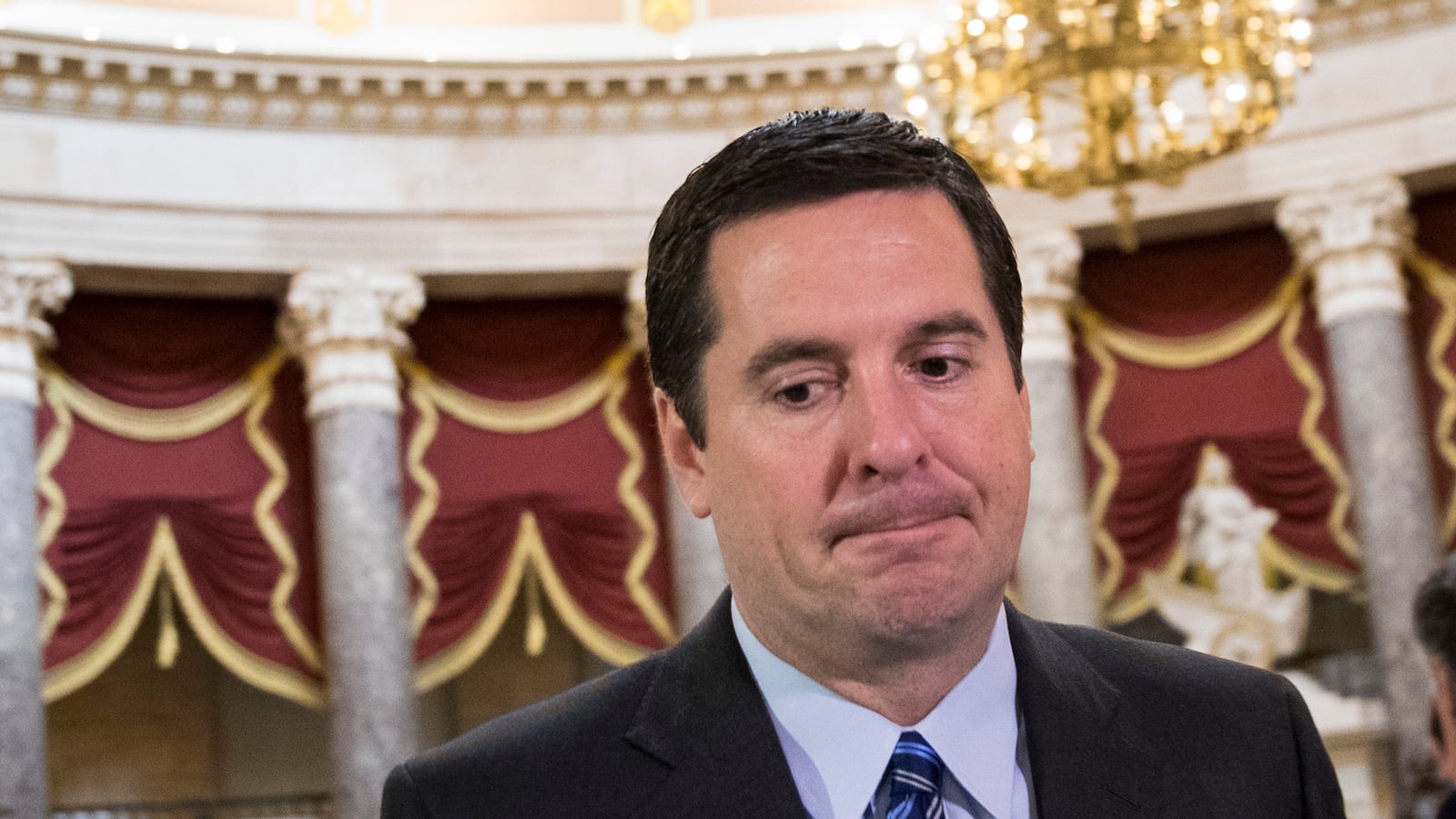The chairman of the House Intelligence Committee is now under an ethics investigation into whether he disclosed classified information without authorization. A Daily Beast review has unearthed a number of instances where that may have occurred.
Rep. Devin Nunes has denied spilling secret information, even as he recused himself from the committee’s Russia investigation into the matter. As the House Ethics Committee announced that it had launched an inquiry, Nunes said the allegations were “entirely false and politically motivated.”
But Nunes may have disclosed secret information in plain sight—during his various press conferences, in which he publicly discussed the contents of Foreign Intelligence Surveillance Act (FISA) surveillance. FISA-authorized surveillance is some of the government’s most tightly held secret information.
Two weeks ago, Nunes told the press that Trump transition team members had been caught up in “incidental collection” during U.S. foreign surveillance. Asked if the information he obtained came from surveillance obtained under FISA, Nunes responded, “it appears so.” He also said, “it has to do with FISA, and there are multiple FISA warrants that are out there.”
“The existence or non-existence of a FISA warrant is a classified fact. The details from the warrant, namely who got caught up in incidental collection, is a classified fact,” national security lawyer Bradley Moss said, when The Daily Beast first considered whether Nunes would be subject to an ethics investigation.
Nunes’s primary defense has been that he did not discuss the matter in great enough detail. Nunes’s spokesman told The Daily Beast last week, “The chairman did not reveal any of the specific details of the information, such as the target of the collection, and did not reveal classified information.”
But on multiple other occasions, at other press conferences, Nunes has spoken about FISA surveillance and specifically connected them to an individual: former national security adviser Michael Flynn.
Criticizing the illegal leak that led to reporting that Flynn had conversations with the Russian ambassador during the Trump transition period, Nunes suggested on Feb. 27 that Flynn’s discussions had been picked up through FISA surveillance.
“Now, the good thing is about FISA and the way it works, there should be a record of who in the government knew about General Flynn talking to the Russian ambassador, and from there we should be able to do know who is in the realm of the possible, who we would need to talk to,” Nunes said at the time.
On March 2, asked about FBI cooperation with the committee, Nunes suggested it would be difficult because the committee was seeking information that had to do with FISA.
“It’s not always easy to get this because you’re talking about information that was gathered through FISA, that some of it possibly was picked up incidentally of Americans, especially as it relates to General Flynn,” Nunes said.
To some experts in the field, there is enough evidence in these public statements to show that Nunes did reveal classified information.
“Each of those remarks disclosed the existence of a classified fact, namely that there was a FISA warrant(s) and that it incidentally collected info on certain U.S. persons,” Moss said Thursday. “The repeated dissemination of the information by Nunes undermines any claim Nunes could make that the unauthorized disclosure was inadvertent or accidental.”
Susan Hennessey, the managing editor of Lawfare and a former lawyer at the National Security Agency, was more bearish on the matter. Nunes’s public statements probably do not involve disclosure of classified information in a way that he could be criminally prosecuted for, she said.
“[However,] it is sufficiently careless that it makes the very strong rhetoric about leaks that Nunes and other congressional Republicans [have criticized] seem a little hypocritical,” Hennessey told The Daily Beast. “I don’t read [Nunes’s statements about FISA] and say, clearly he disclosed classified information. The pieces don’t indicate that to me. There’s a possibility, certainly, that he’s discussing topics that are classified.”
Ultimately, the House Ethics Committee found the matter worthy of investigation. On Thursday, the panel announced it was beginning an 18(a) investigation, which is a staff-driven probe that was initiated by the committee itself, rather than by any sort of outside referral.
“The Committee is aware of public allegations that Representative Devin Nunes may have made unauthorized disclosures of classified information, in violation of House Rules, law, regulations, or other standards of conduct,” the panel said in a statement Thursday. “The Committee has determined to investigate these allegations in order to fulfill its institutional obligation.”
Nunes still has the upper hand. He remains the chairman of the House Intelligence Committee, and a powerful member of Congress. If he had made the same statements about FISA as a less influential federal employee, his career may have already been ended.
“If this were a rank and file federal employee, the odds would certainly be stacked against them. It would be more than likely that they would ultimately lose their security clearance and, consequently, their job,” Moss said.





